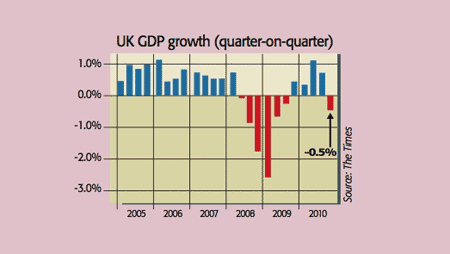
Forecasters and everyone else had a nasty shock this week. The economy shrank by 0.5% in the final quarter of 2010, according to a preliminary estimate of GDP. The consensus forecast was for growth of 0.2-0.6%. December’s cold and snow are partly to blame, said the Office for National Statistics. But even allowing for the unusually poor weather, growth was flat, it reckoned.
The news fuelled fears that the economy is heading for a double-dip. There were calls for the government to abandon its austerity programme. But Mervyn King, governor of the Bank of England, backed the Chancellor’s cuts: “The right course has been set and it is important to maintain it”.
What the commentators said
Before we get too worked up about a double-dip, said Fraser Nelson on Spectator.co.uk, here are a few points to keep in mind. “A quarter of contraction does not make a double-dip.” Erratic GDP swings are common during recoveries. After the 1990 contraction, for instance, growth dipped below zero again in the third quarter after the recession. Moreover, “even on a good day, GDP data is prone to embarrassing revisions”. The preliminary estimate is based on less than half the information available for the second estimate in a few weeks’ time.
The idea that growth would have been flat without the snow also looks too gloomy. “Quite simply that does not square” with what the survey indicators are telling us, according to Andrew Goodwin of the Ernst & Young Item Club. There does seem to have been a slowdown of late, said Allister Heath in CITY A.M; witness November’s weak employment figures. But a sign of relative strength is that government revenue was up year-on-year in December, so tax receipts are healthy. The bottom line, said Heath, is that the economy is probably stronger than the Office of National Statistics suggests, although we won’t really know until the January data comes in.
Even assuming an upward revision to the growth figure, the economy is unlikely to pick up speed soon. The fiscal squeeze sets in this year. Consumers, who account for two-thirds of the economy, face low wage growth, higher taxes and higher inflation. Mervyn King said this week that in 2011, real wages are “likely to be no higher than they were in 2005”. To make life more difficult for the Bank of England, inflation is miles above target and pressure for an interest-rate rise to contain inflation expectations has increased.
Last month two members of the Bank of England’s Monetary Policy Committee voted for a hike. With stagflation apparently making a comeback, it will be a long time before we have fully recovered from the credit crunch.